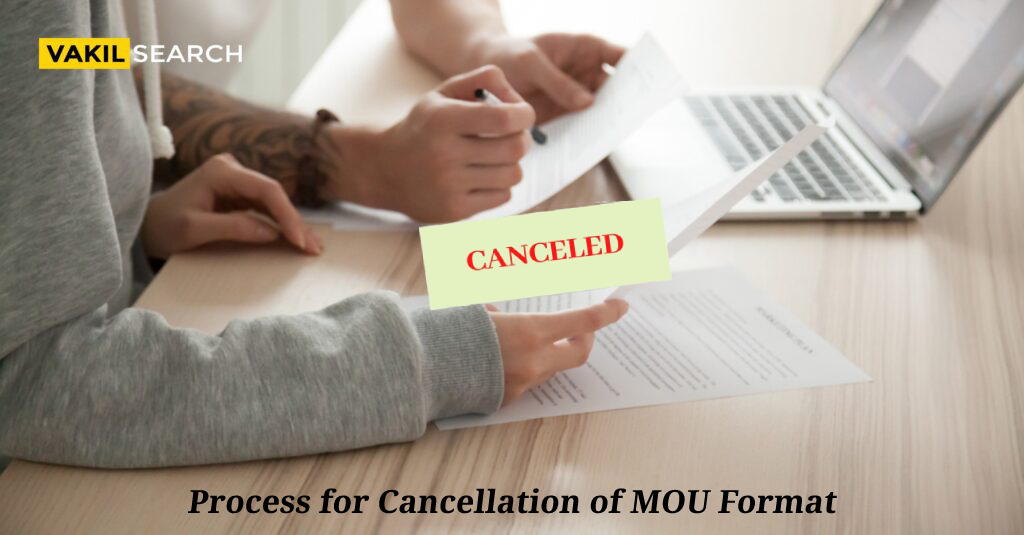MOU Cancellation – Process for Cancellation of MOU Format

Introduction
MOU Cancellation – When entering into an agreement, it is important to understand the potential implications of cancelling a Memorandum of Understanding (MOU). This blog will provide the following:
- An overview of what an MOU is.
- The various reasons for cancelling one.
- The steps involved in cancelling an MOU.
- The legal implications of cancelling an MOU.
- Some tips for drafting an MOU to help avoid unnecessary cancellations.
We’ll also discuss how you can navigate the cancellation process respectfully and respectfully.
What is a Memorandum of Understanding (MOU)?
A Memorandum of Understanding (MOU) is a document used to outline an agreement between two or more parties. It is typically non-binding, meaning that the parties involved do not have a legal obligation to carry out the terms of the agreement. MOUs are usually used in situations where the parties want to come to an understanding about an arrangement but want to avoid entering into a legally binding contract. The MOU outlines the details of the arrangement and can be customized to fit the needs of the parties. It is important to note that an MOU is not legally binding, and either party can cancel it at any time.
Reasons for Cancelling an MOU
Negotiating a Memorandum of Understanding (MOU) is an important step in any agreement between two parties. However, there may be times when an MOU needs to be cancelled. Reasons for cancelling an MOU can include a lack of trust between the two parties, a lack of common understanding of the terms, or if one of the parties is unable to comply with the terms of the MOU. In some cases, an MOU may be cancelled due to a change in circumstances or a change in priorities. Regardless of the reason, it is important to discuss the cancellation of an MOU openly and professionally with the other party in order to maintain a positive relationship and avoid any unnecessary conflict.
The Cancellation Process
The process of cancelling an MOU can be a complicated one. It is important to be aware of all the steps involved in order to ensure that everything is done correctly:
- Both parties should agree to cancel the MOU in writing. This should include the exact date and time that the MOU will end.
- Any remaining obligations should be fulfilled, including the return of any documents, equipment, or money that both parties may have exchanged.
- Both parties should sign a cancellation document to end the MOU officially.
It is important to keep a copy of this document for both parties’ records. The cancellation process can go as smoothly as possible by following these steps.
Legal Implications of Cancelling an MOU
Considering cancelling an MOU, it is important to recognize that there may be legal implications. Cancelling an MOU is essentially a contract termination and should be treated as such. Therefore, it is important to read the MOU in its entirety and make sure you understand any legal terms and conditions that may apply. Depending on the MOU, there could be significant consequences for both parties. It is important to ensure that the MOU is properly terminated so that both parties are legally protected. If necessary, consult with a lawyer to ensure that all legal implications have been considered.
Tips for Drafting an MOU to Avoid Unnecessary Cancellations
Drafting an MOU (Memorandum of Understanding) can be an effective way to ensure that all parties involved in an agreement are aware of their responsibilities and expectations. To avoid unnecessary cancellations, it is important to include clear language in the MOU that outlines the obligations and expectations of each party. Additionally, it is important to include a timeline for the completion of the agreement, as well as any necessary contingencies for a variety of possible scenarios. Finally, make sure to include a signature line at the end of the MOU to make it legally binding. By following these tips, you can help ensure that the MOU holds up and that any potential issues or cancellations are avoided.
Conclusion
In conclusion, a Memorandum of Understanding, or MOU, is a formal agreement between two or more parties, which can be cancelled if necessary. There are a variety of reasons why an MOU may need to be cancelled, including a change in circumstances or a breach of contract. The cancellation process is different for each situation, so it is important to be aware of the legal implications of cancelling an MOU. To prevent unnecessary cancellations, it is important to ensure that the MOU is drafted in a way that is clear and comprehensive.
